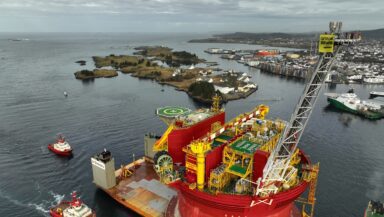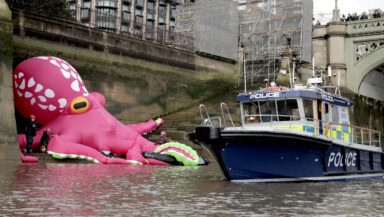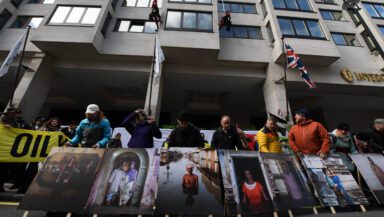- Greenpeace activists blocked a BP oil rig from drilling new oil wells in the North Sea for 12 days in June last year.
- BP’s rig operator, Transocean, is seeking unlimited fines and prison sentences for Greenpeace’s boss over the rig protest.
- But following a separate legal challenge from Greenpeace the government admits the permit process was unlawful, after the public was robbed of the chance to contest it.
- Government’s mistake could apply to all offshore drilling permits.
- Greenpeace will now apply to have BP’s permit quashed on climate grounds.
The government admits it acted unlawfully in granting BP’s permit to drill for new oil in the North Sea, a Greenpeace legal challenge reveals, after officials rubber-stamped BP’s drilling application with no public scrutiny.
In August 2018 BP was given the green light to drill in the Vorlich Field, 150 miles east of Aberdeen. But the government failed to officially publish BP’s permit – something it is legally required to do – which meant the permit could not be challenged by the public.
Greenpeace protested BP’s drilling of the Vorlich Field by blocking its oil rig for 12 days in the North Sea last June, and took on BP in the courts by seeking a court order to force the government to publish the permit, so that it could be legally challenged.
John Sauven, Greenpeace UK executive director, faces up to two years in prison over the rig protest after BP’s rig operator Transocean accused Greenpeace of being in contempt of court.
But the government has now admitted that due to the complete lack of public scrutiny, BP should not have been setting off to drill in the first place. The government’s error applies not only to this permit, but could apply to all other drilling permits in the North Sea.
John Sauven, Greenpeace UK Executive Director, said: “All the evidence tells us that if companies like BP keep on hunting for new oil it will drive us deeper into the climate emergency.
“Yet the government still decided to rubber stamp BP’s request to drill for new oil regardless of the consequences and the legality of the process.
“Greenpeace will now seek to get BP’s drilling permit quashed. BP needs to stop fuelling the climate emergency, which is threatening the safety of our planet and putting lives at risk.”
When deciding whether to award a permit, the government is legally required to complete an Environmental Impact Assessment to determine whether the drilling will harm the environment.
But government assessments only take into account the impact of the drilling activity itself on the local environment, but they don’t include an assessment of the harm that will be done to our climate by burning the oil that’s produced. Greenpeace maintains that that is both reckless and unlawful.
The world’s scientists tell us that we cannot burn all the oil and gas we already have, so any new development of oil and gas fields would be disastrous for our climate. Despite this, the government gave BP a permit to drill for 20,000 barrels of oil per day. Greenpeace is now able to launch a judicial review in the Scottish Courts to challenge BP’s permit on climate grounds, and seek a court order to quash the permit, which would prevent BP from extracting any new oil.
The court order to publish BP’s permit comes as the oil industry finds itself in turmoil. Oil prices are plummeting due to the coronavirus crisis and because an ongoing dispute between Russia and Saudi Arabia is driving up production, creating an oil glut.
Greenpeace is calling for any government bailouts for the oil and gas sector to come with strict conditions requiring companies to support their workers, and to shift to renewable energy.
ENDS
NOTES TO EDITORS
- Contact the UK press office on: press.uk@greenpeace.org or 020 7865 8255 or 07506 512442
- Greenpeace were represented by Richard Harwood QC, instructed by Harrison Grant.
- BP’s permit was officially published in The Gazettes on Friday April 3.
- Under the Assessment of the Effects of Certain Public and Private Projects on the Environment Directive 2011 (as amended 2014) the government is required to publish its decisions in granting permits to companies like BP.
- Once these permits are published, the public is able to scrutinise them and challenge them in court through judicial review.
- But, if the permits aren’t published, there is no official legal route through which the decisions can be challenged, as was the case with BP’s permit.
- In this case, Greenpeace launched a legal bid to force the government to publish BP’s permit, so that once published, a second legal case could be brought to try to quash the permit altogether.
- Greenpeace’s judicial review case follows a successful case brought by Neil Garrick-Maidment of the Seahorse Trust last year, which challenged the legality of permit granted to energy firm Carillion, on the grounds that there had not been a proper public consultation.
- After the Seahorse case, the then business secretary Andrea Leadsom agreed to carry out a detailed review of the Offshore Petroleum Production and Pipe-lines (Assessment of Environmental Effects) Regulations 1999 and amend them following public consultation. As yet there has been no public announcement on the progress of that consultation.
- In a separate legal case, BP’s rig operator, Transocean, has asked Scottish courts to impose unlimited fines on Greenpeace and to jail its executive director, after it accused Greenpeace of breaching a court interdict by continuing its rig protest last year.
- The verdict in that case had been due on Monday March 23, but it has been postponed by Edinburgh’s Court of Session until further notice.



